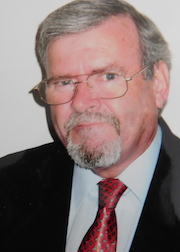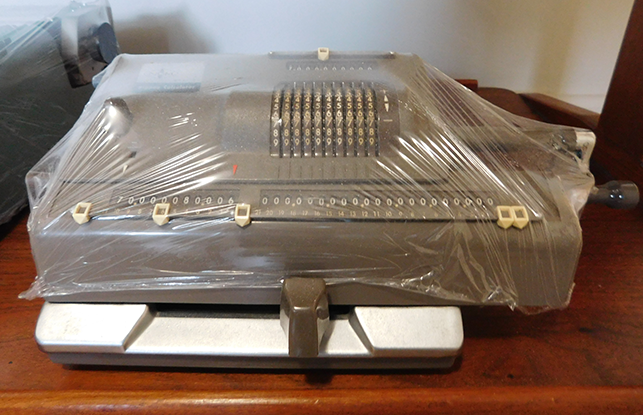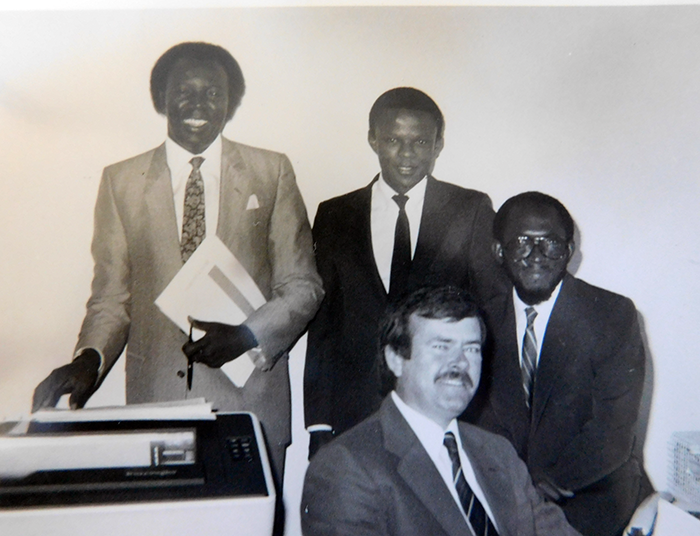Life After Chase: Dave Farrell
A Life in Africa: Not for the Faint-Hearted
NOTE: While Life After Chase is normally reserved for non-financial "after lives", Dave Farrell's account covers a region – Africa – rarely covered on this website, so we thought it would indeed be of interest to fellow alumni.

My life after Chase began after The Standard Bank of South Africa (SBSA) absorbed three branches of The Chase Manhattan Bank of South Africa in September 1965. I would remain loyal to Standard Bank for a further 35 years, until retirement in the year 2000 as Senior Operations Manager Africa and Director of Banks.
How did I feel at the time of the take-over in 1965? Well, at 21 years of age it was a mix of sadness and perhaps the lost hope of the "American Dream" and a future with Chase in New York. The American management team was there one minute and gone the next – no farewell as far as I can remember just a surgical and a final end. We had just won the Johannesburg interbank soccer league, we were known as the "Chase Yankees" with several added players from City Bank, French Bank and the Bank of Athens.
I have endeavoured to stay away from as much of the detailed financial aspects of banking as possible, but I can probably give you chapter and verse concerning banking in Africa and Madagascar, which would fill a book or two. My article is therefore a summary of mainly personal and memorable experiences in my life after Chase, which I hope will be of interest to the Alumni members.
The British Protectorate of Swaziland - independent in 1968.
As a British citizen, I volunteered to serve in Swaziland from 1966 to 1972 with The Standard Bank of Swaziland Limited, starting from the bottom and ultimately specializing in Foreign Exchange and Trade Finance, deemed essential to equipping myself for future positions with SBSA.
A picture of my first "hi tech" Nippon calculator (coffee grinder) is shown below. American tourists laughed at it and the bank was forced to upgrade and replace it with an electrical calculator ordered from Johannesburg, South Africa.

My return to South Africa 1972.
This would involve specialized training in Organization & Methods, Work Study and specialized training at Cranfield School of Management England with ongoing Project work in the Bank's Head Office Administration and Branch Network.
Due to my Swaziland service and experience, I was loaned to The African Bank Limited to stabilize their banking operations, systems and procedures over the period 1980 to 1983. It was a wholly owned Black bank, where I served as General Manager's Assistant to Moses J. Maubane.
Moses was often in Washington for discussions as to a pathway towards democracy post-Apartheid (separate development), which eventually came to fruition in 1994 under Nelson Mandela. I truly believed that the late Moses Maubane would be the future President of South Africa.
The picture below shows Moses on the left and me testing the new centralized computer system.

"Hard to explain the experience other that the
The 1980s in South Africa were very dangerous due to the struggle for majority rule. I was unfortunately caught in a full-scale riot in Bophuthatswana, an independent Bantu homeland. Hard to explain the experience other that the thunder of what sounded like hundreds of elephants careering Being the only pale face in town, I burned rubber as fast as I could to escape towards Pretoria.
Most of African Bank's branches were in densely populated black townships such as Soweto, volatile, unpredictable and explosive to say the least. I am probably the only banker to ever have had striking motor industry workers, demanding money from their restricted-withdrawal Christmas savings accounts, removed from a bank at gunpoint by the local Bophuthatswana riot police and let back in one by one. The regular customers were being harassed and the bank at risk of being burned down with me in it.
Re-entry into Africa.
The late 1980s and early 1990s allowed Standard Bank to re-enter Africa with the acquisition of ANZ Grindlays Africa network in 1992, which meant I would travel to Tanzania, Zanzibar, Zambia, Zimbabwe, Kenya and also Mozambique and Madagascar. Madagascar would involve establishing a new bank in partnership with The Mauritius Commercial Bank – the highlight of my career, where I would serve as Director of Union Bank of Madagascar for seven years until my retirement in 2000.
I have previously concluded under "My Mentor" that Africa is not for the faint-hearted. Too true: three bouts of malaria; contracting Madagascar Fever whilst trapped for two weeks in a revolution, giving myself the last rites; near death in Daar es Salaam with amoebic dysentery with black crows pecking at my hotel window, with the loss of 10 kilograms in weight...very drastic. (My wife was not impressed when I fell down the steps of the plane in Johannesburg.)
What can I say in conclusion, other than thank you to the Board of Chase in 1965 and to my Chase mentor, Bob Dandrea, for giving me the ride of my life after Chase, meeting presidents, government ministers, royalty and revolutionaries along the way.
Do you have comments or a story of your own?
Please send to news@chasealum.org. You can submit your story fully written or ask to be interviewed.
